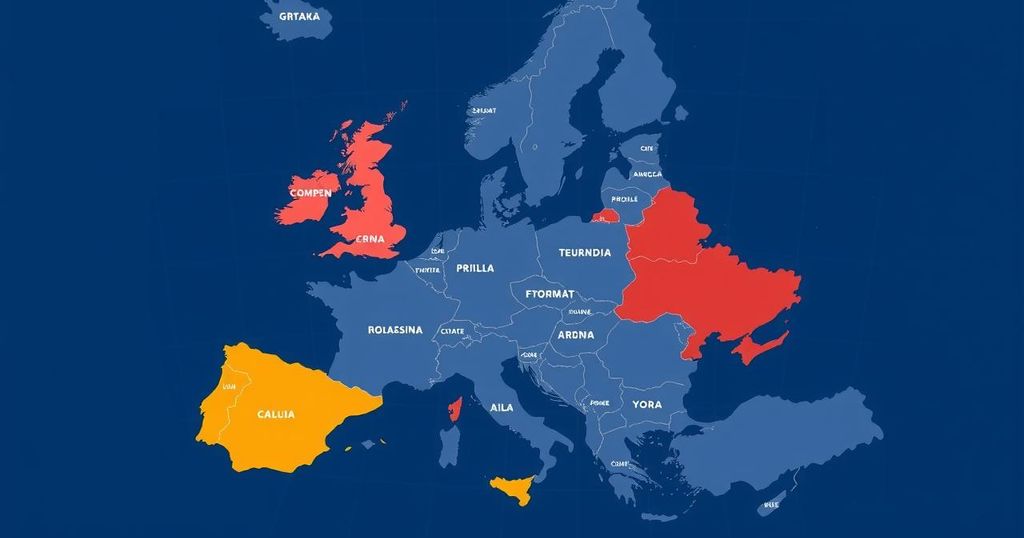The Impacts of the U.S. Election on Europe’s Future

The impending U.S. presidential election poses crucial challenges for Europe, particularly around prospective trade tariffs, business uncertainties, and defense commitments. Candidates Donald Trump and Kamala Harris offer markedly different visions that could significantly alter U.S.-European relations amidst Europe’s economic and security crises, notably in light of Russia’s aggressive posture and growing geopolitical tensions.
As the U.S. presidential election approaches, the outcomes of this pivotal event hold immense significance not only for America but also for Europe. The candidates, Donald Trump and Kamala Harris, represent contrasting futures for the transatlantic relationship amid several pressing challenges facing Europe, including economic turbulence, the persistence of nationalist movements, and security threats due to Russia’s aggression in Ukraine. 1. The prospect of increased tariffs looms large, particularly with Trump’s proposed tariffs ranging from 10% to 20% on cross-border trade. Such measures could severely impact the European Union, which relies heavily on trade with the U.S. and employs millions across both regions. Zach Meyers from the Centre for European Reform warns that Trump’s tariffs would stifle economic growth within the EU, with critical economies like Germany suffering potential GDP reductions. Conversely, Harris’s approach is expected to promote diplomatic engagement, potentially bolstering European competitiveness in the U.S. market. Nonetheless, both candidates may exacerbate tensions with China, further complicating Europe’s economic ties with the Asian power. 2. Uncertainty in business sectors is another byproduct of the electoral outcomes. Knightley alludes to the potential for Trump’s election to incite fluctuations in both economic and geopolitical climates, while viewing Harris as a stabilizing figure. Moreover, the EU’s ongoing challenges in keeping pace with technology and innovation create existential threats; hence, aligning regulations between the U.S. and the EU could prove beneficial. 3. Defense is a further crucial area whereby the candidates’ differing perspectives may alter Europe’s military landscape. Many EU nations are heavily reliant on U.S. support, particularly in light of the Russia-Ukraine conflict. Steven Blockmans notes that Trump’s past intentions to withdraw from NATO could destabilize European defense strategies, while Harris is anticipated to continue bolstering NATO and ensure unwavering support for Ukraine. Causing potential shifts could embolden far-right leadership across Europe, jeopardizing the stability of democratic governance in the region. In summary, the U.S. election outcome will likely have profound implications for Europe in terms of trade, innovation, and geopolitical alliances. With Europe longing for predictable and stable relations with the U.S., the stakes could not be higher. The varying approaches of the candidates necessitate careful consideration of future transatlantic collaboration.
The upcoming U.S. election is set against a backdrop of growing challenges for Europe, making the stakes particularly high. The region faces economic difficulties marked by volatility, bolstering national security, and the rise of nationalism—all exacerbated by Russia’s invasion of Ukraine. The U.S. plays a crucial role in trade and defense for Europe, which significantly influences European nations’ future direction. The contrasting policies of presidential candidates Donald Trump and Kamala Harris highlight potential shifts in U.S.-European relations and the broader geopolitical landscape.
In conclusion, the U.S. election presents critical implications for Europe, particularly in areas of trade, innovation, and defense policy. Whether under a Trump administration or a Harris-led government, the balance of power and collaboration between the U.S. and Europe is poised for significant shifts, urging European nations to prepare for transformative experiences ahead. Stability and predictability in transatlantic relations will be essential as Europe navigates unprecedented challenges in this evolving landscape.
Original Source: fortune.com








